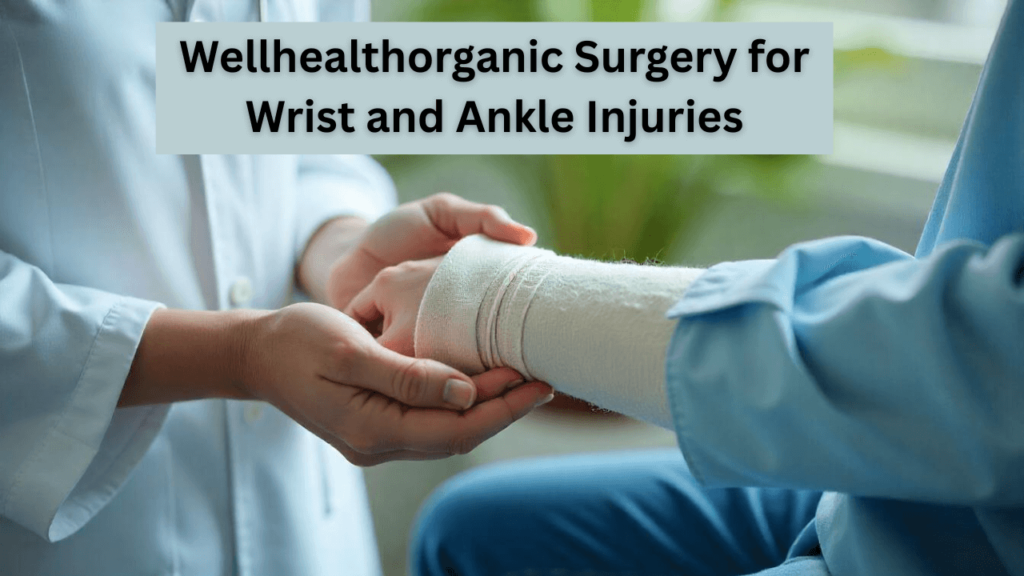Recovering from joint injuries can be challenging, especially when it comes to the wrists and ankles. These joints support everyday movements, and even a minor issue can disrupt daily life. For those exploring natural recovery options or holistic health support, wellhealthorganic surgery for wrist and ankle injuries has become a trending topic among health-conscious individuals.
This blog explores how organic wellness, advanced surgical techniques, and natural healing can work together. From understanding the types of injuries to the benefits of combining surgery with holistic care, we’ll help you make informed decisions.
Understanding Wrist and Ankle Injuries and When Surgery Is Needed
Wrist and ankle injuries are common among athletes, older adults, and individuals who perform repetitive tasks. Sprains, fractures, ligament tears, and tendon damage can range from mild to severe. While rest, physiotherapy, and medication help in many cases, certain conditions require surgical intervention.
Wrist injuries that might require surgery include:
- Scaphoid fractures that do not heal with casting
- Carpal tunnel syndrome with severe nerve compression
- Torn ligaments or dislocated bones
Ankle injuries requiring surgical care often involve:
- Complete Achilles tendon ruptures
- Complex fractures of the ankle bone
- Ligament reconstructions after repeated sprains
When conservative treatments fail or the damage is too extensive, surgery becomes necessary. Here’s where wellhealthorganic surgery for wrist and ankle injuries comes into play—it blends traditional procedures with natural post-op recovery techniques.
Why Combine Organic Healing with Surgery?
Holistic approaches emphasize healing the body as a whole rather than targeting only the injured area. When combined with surgery, these practices can enhance recovery.
Benefits include:
- Reduced inflammation and pain using herbal remedies
- Faster healing through organic nutritional support
- Better joint mobility with natural physiotherapy techniques
- Lower risk of infection by avoiding synthetic medications when possible
Patients following wellhealthorganic surgery for wrist and ankle injuries often report less discomfort and fewer side effects. Doctors integrate clean eating, herbal supplements, and body detox with conventional surgical care.
The Surgical Process and Organic Recovery Timeline

Understanding the surgical steps and how organic support fits into the timeline helps manage expectations. Each injury type comes with its own procedure and recovery duration.
Here’s a typical breakdown of the process:
| Stage | Conventional Step | WellHealthOrganic Support |
|---|---|---|
| Pre-Surgery | Diagnosis, imaging, planning | Organic detox, anti-inflammatory herbs |
| During Surgery | Incision, repair, stitching | Anesthesia with minimal toxins |
| Immediate Recovery | Rest, immobilization | Clean nutrition, herbal supplements |
| Long-term Rehab | Physiotherapy, strengthening | Natural joint lubricants, yoga, massage |
Most patients need 6–12 weeks for basic recovery, with full function returning in about 3–6 months depending on severity.
Key Components of Post-Surgical Organic Recovery
Let’s dive into specific areas where wellhealthorganic principles support healing.
Diet and Nutrition
Food is medicine. After surgery, your body needs nutrients to rebuild tissues, reduce swelling, and fight off infections. A wellhealthorganic diet emphasizes:
- Leafy greens and antioxidant-rich vegetables
- Anti-inflammatory spices like turmeric and ginger
- Omega-3 fatty acids from flax seeds and walnuts
- Hydration through herbal teas and mineral water
Avoid processed foods, sugar, and refined grains during recovery.
Herbal and Natural Supplements
Certain herbs speed up healing, reduce pain, and prevent blood clots. Popular choices include:
- Arnica: Reduces bruising and inflammation
- Bromelain: Speeds up tissue repair
- Ashwagandha: Balances cortisol, reducing stress
Always consult your doctor before mixing herbs with post-surgery medications.
Gentle Movement and Mindful Therapy
As soon as the doctor clears you, movement therapy is essential. A natural rehab plan might include:
- Yoga-based stretching to regain flexibility
- Acupressure and reflexology for pain relief
- Hydrotherapy (water exercises) for gentle strength training
Patients undergoing wellhealthorganic surgery for wrist and ankle injuries often experience smoother rehab with fewer complications.
Insights: Organic Healing vs Traditional Recovery
Here’s a comparison table to highlight differences:
| Factor | Traditional Recovery | WellHealthOrganic Recovery |
|---|---|---|
| Pain Management | Prescription drugs | Herbal pain relief, meditation |
| Inflammation Control | NSAIDs | Turmeric, ginger, cold compress |
| Nutrition | No focus | Whole-food, clean diet |
| Physical Therapy | Machines, routines | Mindful yoga, herbal oils |
| Emotional Health | Often ignored | Focus on stress relief, sleep hygiene |
The organic route doesn’t replace surgery—it enhances it. With this blend, recovery becomes a full-body, whole-person experience.
When to Consider Organic-Assisted Surgery?
Not every case requires this approach. But you may want to consider it if:
- You are sensitive to medications or chemicals
- You believe in natural healing principles
- You’ve had past surgery complications
- You’re looking for faster, well-rounded recovery
Talk to a surgeon familiar with organic recovery or an integrative care provider. More hospitals now support these dual approaches, recognizing patient demand for cleaner, more sustainable healing.
Common Mistakes in Recovery and How to Avoid Them
Even with the best care, patients can make mistakes that slow down healing. Here’s what to avoid:
- Skipping rest: Movement is good, but don’t rush.
- Ignoring diet: Nutrients are essential—don’t just rely on pills.
- Overusing painkillers: These can harm organs; balance with natural relief.
- Not following up: Stick to your follow-up schedule for safe progress.
To support your recovery journey, explore more about wellhealthorganic fitness and how it complements surgical healing.
FAQs
What is wellhealthorganic surgery for wrist and ankle injuries?
It refers to combining surgical treatment of wrist and ankle injuries with organic healing methods like herbal supplements, clean eating, and holistic physical therapy to enhance recovery and reduce complications.
How long does recovery take after wrist or ankle surgery?
Basic healing usually takes 6 to 12 weeks. Full mobility and strength may return in 3 to 6 months, depending on the injury and the effectiveness of post-op care.
Is organic healing effective after joint surgery?
Yes. When guided by professionals, organic healing can reduce inflammation, speed up tissue repair, and improve overall well-being without relying heavily on synthetic medication.
Can I avoid surgery with natural methods?
Mild sprains or minor tendon injuries may improve with organic therapy alone. However, serious injuries like fractures or torn ligaments often require surgery to ensure proper healing.
